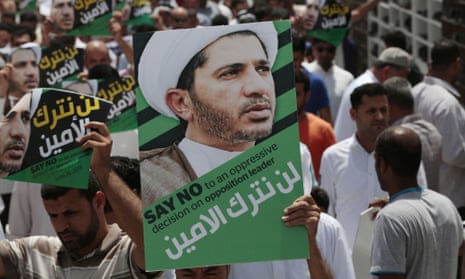Bahrain is facing criticism from human rights watchdogs and from Britain, normally a supportive ally, after a court jailed the country’s main Shia opposition leader for four years on charges of trying to change the political system by force.
Sheikh Ali Salman, secretary general of the al-Wefaq national Islamic movement, was arrested last December after calling for political reform and accountability in the small Gulf island state, where the Sunni Al-Khalifa monarchy rules over a restive Shia majority.
He was charged with “incitement to promote change of the political system by force, threats and other illegal means” as well as “incitement to loathing and contempt of a sect” and “publicly insulting the interior ministry”. Salman was acquitted of a more serious charge of attempting to overthrow the regime.
Bahrain, home to the US navy’s fifth fleet, has faced sporadic unrest since a largely Shia-led uprising in 2011 demanding a constitutional monarchy and more representative government. At least 89 people have been killed in clashes with security forces. Hundreds have been arrested and put on trial.
Unusually, the US issued a warning at the time that Salman’s arrest could “inflame tensions”. But in recent weeks there have been signs that Washington is quietly working to lift a four-year ban on delivering weapons that was imposed because of the crackdown. Bahrain, which is a very close to Saudi Arabia, is a member of the Arab coalition fighting Islamic State.
Britain, which ruled Bahrain until independence in 1971, has been criticised for maintaining business as usual with Manama. This week it opened a new naval base there. “The message to Bahrainis is that the UK cares only about its arms business, and its talk of human rights is just empty,” said Sayed Alwadaei, of the opposition Bahrain Institute for Rights and Democracy.
Tobias Ellwood, the UK foreign office minister, issued the mildest of rebukes. “I am concerned by the verdict and the sentence handed down to Sheikh Ali Salman and I raised this case with the Bahraini authorities during my visit last weekend,” he said in a statement. He did not call for Salman’s release.
The Manama government has said it is following recommendations for changes made by an independent commission, but key proposals have never been implemented. Bahraini sources say the reform-minded crown prince has been sidelined by more hardline elements in the aftermath of the Arab spring.
Amnesty International said: “Today’s verdict is shocking. It is yet another clear example of Bahrain’s flagrant disregard for its international obligations. Sheikh Ali Salman has been sentenced solely for peacefully expressing his opinion.”
Bahraini government officials often accuse Iran of backing the opposition, though there is little evidence of its direct involvement. Bahrain features prominently in Iranian propaganda.
Ali al-Aswad, a former Wefaq MP, said: “The message from Bahrain is crystal clear: for at least the next four years there will be no dialogue in Bahrain. Locking away the leader of the main opposition party, a figure who has done nothing but promote peacefulness, means the door to reform is firmly locked.
“Where Bahrain heads to now is determined by the reaction this decision provokes internationally. If it is not met with widespread disapproval, the authorities will feel emboldened that this decision was correct and continue to shut out the opposition.”
Human Rights First said: “Sending the leader of the main opposition group to jail for peaceful protests only encourages those pushing for violent change. How the US government responds is a major test of the Obama administration’s vision for the region.”
Al-Wefaq boycotted Bahrain’s elections last November on the grounds that promised reforms had not taken place. Critics accuse it of pursuing a radical agenda and encouraging violence, but it insists its methods are peaceful and its sole interest is democracy. Unlike other Bahraini opposition groups that have demanded the overthrow of the Al Khalifa, al-Wefaq wants a constitutional monarchy.
Brian Dooley, of HRF, said: “Silencing peaceful dissent is a script we’ve seen before, from Egypt to Guatemala to Zimbabwe. It never ends well.”
